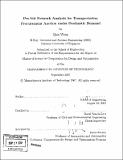Pre-bid network analysis for transportation procurement auction under stochastic demand
Author(s)
Wang, Qian
DownloadFull printable version (4.296Mb)
Other Contributors
Massachusetts Institute of Technology. Computation for Design and Optimization Program.
Advisor
David Simchi-Levi.
Terms of use
Metadata
Show full item recordAbstract
Transportation procurement is one of the most critical sourcing decisions to be made in many companies. This thesis addresses a real-life industrial problem of creating package bids for a company's transportation procurement auction. The purpose of offering package bids is to increase the carriers' capacity and to improve the reliability of services. In this thesis, we investigate the possibility of forming packages using the company's own distribution network. Effective distribution of packages requires balanced cycles. A balanced cycle is a cycle containing no more than 3 nodes with equal loads (or volume of package) on every link in the cycle. We develop mixed-integer programs to find the maximum amount of network volume that can be covered by well-balanced cycles. These models are deterministic models that provide a rough guide on the optimal way of package formation when loads are known in advance. Since demand is random in real life, we perform a stochastic analysis of the problem using various techniques including simulation, probabilistic analysis and stochastic programming. Results from the stochastic analysis show that the effectiveness of package distribution depends on how we allocate the volumes on the lanes to create balanced cycles. If we always assign a fixed proportion of the lanes' volumes to the cycles, then it is only possible to have well-balanced cycles when the average volumes on the lanes are very large, validating the advantage of joint bids between several companies. However, if we assign a different proportion of the lanes' volumes to the cycles each time demand changes, then it is possible to create cycles that are balanced most of the time. An approximated solution method is provided to obtain a set of balanced cycles that can be bid out.
Description
Thesis (S.M.)--Massachusetts Institute of Technology, Computation for Design and Optimization Program, 2007. Includes bibliographical references (p. 67-68).
Date issued
2007Department
Massachusetts Institute of Technology. Computation for Design and Optimization ProgramPublisher
Massachusetts Institute of Technology
Keywords
Computation for Design and Optimization Program.